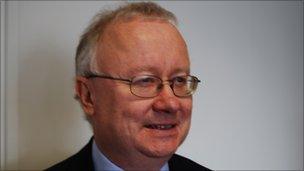Their destiny in their own hands?
- Published
- comments

Students could soon see fewer universities in Wales
A year ago today, the Education Minister Leighton Andrews made a speech which shook the university sector in Wales to its foundations. His then Tory shadow, David Melding was up front in his response: "I don't know whether I'm in shock or awe".
The headline of Mr Andrews' speech was that there would be significantly fewer universities in Wales by 2013, indicating smaller institutions were to be forced into mergers if needs be in order to provide a more efficient service.
"This target does not mean fewer students. But it is likely to mean fewer vice chancellors" he said.
A year closer to that 2013 target, where are we? Thanks to a colleague who has been thinking hard and hitting the phones hard over the past few days, here, a year on, is where we seem to be.
One senior figure in Welsh academia describes the current situation as "a total mess". The scene is apparently a bit like a school disco - and don't pretend you can't remember those vividly - with some institutions talking to several potential partners at once about possible mergers, some openly, some behind the scenes and some with a sinking feeling in the stomach and a brave look on their face.
It's been a year of to-ing and fro-ing with no real discernable results in terms of the kind of large scale, fundamental restructuring of the sector that the Minister is demanding.
Discussions around the so-called "super university" - the merger of UWIC, Swansea Metropolitan, Trinity St Davids and the University of Wales are ongoing, we're told.
As for fewer vice-chancellors, it's worth pointing out in passing that in the year since Mr Andrews' speech, both Aberystwyth and Bangor have recruited new VCs.
At the moment, the sector is in something of a state of suspended animation, waiting to see whether the Higher Education Funding Council for Wales approves the re-submitted fee plans which would enable them to charge up to £9,000 in fees from 2012.
In a possible indication that not all of them will be approved, today also happens to be the closing date for applications to sit on a panel, external to which universities will be able to appeal HEFCW decisions on their fee plans.
Finance may be even more of a driving force than geography - or ministerial insistence - when it comes to consolidation in the HE sector. Some universities are considerably better off than others but mergers would also lead to considerable rationalisation for staff and departments, as well as vice-chancellors.

Could Leighton Andrews be planning a radical intervention in the Welsh HE sector?
In the last resort, does the Minister have the power to forcibly merge universities in order for his, so far not exactly self-fulfilling, prediction of a year ago to come true? Legally, yes he does - under the Education Reform Act 1988, external, pointedly referred to in his remit letter, external to HEFCW for this financial year.
Politically, it would be what Sir Humphrey (currently starring on stage at the Wales Millennium Centre) would describe as a "very courageous step, Minister".
But the Minister may decide that the events, or lack of them, over the last year around collaboration has taught him that institutions may need a push - or something more - to get together.
Could the announcement from HEFCW of their final decision on fee plans scheduled for July 11 be a catalyst for something more fundamental, where the future shape of higher education won't be left to the universities themselves any longer?
Funny that. Our teachers used to stop budding partners from getting too familiar on the dance floor ... not shove them together before the lights came back on.